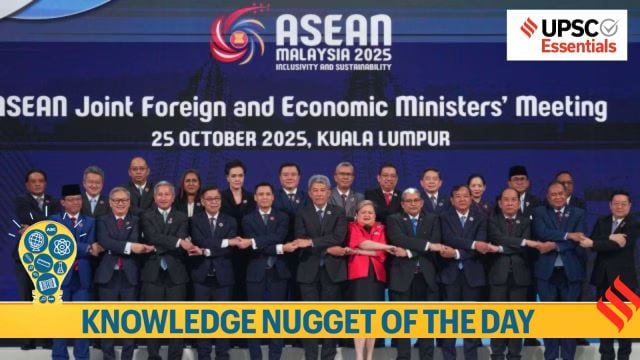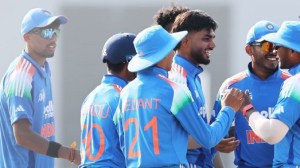
Why in the news?
Addressing the ASEAN-India leaders’ summit in Kuala Lumpur via virtual mode, Prime Minister Narendra Modi said, “The 21st century is our century, the century of India and ASEAN.” He also declared 2026 as the ‘ASEAN-India Year of Maritime Cooperation’. In this context, let’s know about ASEAN in detail and recent developments around it.
Key Takeaways :
1. The Association of Southeast Asian Nations (ASEAN) welcomed East Timor as its newest member on Sunday (October 26), at its ongoing summit in the Malaysian capital of Kuala Lumpur.
2. Notably, East Timor, also known as Timor-Leste, had long attempted to join ASEAN, given the organization’s significance in maintaining economic, political and security coordination in the region.
3. The joining of East Timor in ASEAN also marked the bloc’s first expansion in years, after Cambodia last joined it in 1999.
About ASEAN
1. According to the ASEAN website: On 8 August 1967, five leaders – the Foreign Ministers of Indonesia, Malaysia, the Philippines, Singapore and Thailand – came together in Bangkok. Thailand was brokering some disputes among Malaysia, Indonesia and the Philippines, and it eventually led to the signing of a document- ASEAN Declaration.
Story continues below this ad
2. Over the next few decades, five other countries joined them – Brunei Darussalam, Lao PDR, Cambodia, Myanmar and Vietnam. Now that East Timor has joined the block as its newest member, the total number of ASEAN member countries has increased to 11.
3. They have an anthem, a flag and biannual summits (twice a year) with a rotating chairmanship. Its official motto is “One Vision, One Identity, One Community”.
4. The ASEAN Declaration conveyed the aspiration to further regional cooperation in the economic, social, cultural, technical, educational and other fields, and in the promotion of regional peace and stability and adherence to the principles of the United Nations Charter.
5. Its major pillars are Political-Security Community (APSC), Economic Community (AEC) and Socio-Cultural Community (ASCC).
Story continues below this ad
6. Malaysia is the Chair of ASEAN for 2025 and it will be the Philippines in 2026. The theme of this year’s ASEAN summit is ‘Inclusivity and Sustainability’.
India and ASEAN
1. ASEAN is central to India’s Act East policy, which focuses on the extended neighbourhood in the Asia-Pacific region.
2. India is part of the ASEAN Plus Six grouping. The other countries in this grouping include China, Japan, South Korea, New Zealand and Australia as well.
3. In 2010, a Free Trade Agreement was signed and entered into force between India and ASEAN. While India was part of negotiations to join the Regional Comprehensive Economic Partnership (RCEP) in 2020, it ultimately decided not to do so.
Story continues below this ad
4. India and ASEAN started to hold summits together in 2002 — a decade after the country established formal engagement with the group.
BEYOND THE NUGGET: What is ‘Global South’ and ‘Global North’?
1. In the simplest sense, Global South refers to the countries of Asia, Africa, Latin America, and Oceania. Most of these countries, where 88 per cent of the world population lives, experienced colonial rule and historically lagged in achieving substantial levels of industrialisation.
2. The developed countries of North America and Europe, on the other hand, are often referred to as the Global North.
3. According to the United Nations Conference on Trade and Development, Global South countries typically exhibit lower levels of development, higher income inequality, rapid population growth, agrarian-dominant economies, lower quality of life, shorter life expectancy, and significant external dependence.
Story continues below this ad
4. The term Global South, thus, denotes political, geopolitical, and economic similarities between nations. Hence, it should not be conflated with strict geographical connotations. For instance, most Asian countries fall under the Global South. Yet, countries such as Israel, South Korea, and Japan are considered part of the Global North because of their higher levels of development.
Post Read Question
The term ‘Regional Comprehensive Economic Partnership’ often appears in the news in the context of the affairs of a group of countries known as (UPSC CSE 2016)
(a) G20
(b) ASEAN
(c) SCO
(d) SAARC
(Sources: Our ties a robust foundation for stability, development amid uncertainties: PM Modi to ASEAN, Asia’s youngest nation joins ASEAN)
Subscribe to our UPSC newsletter. Stay updated with the latest UPSC articles by joining our Telegram channel – Indian Express UPSC Hub, and follow us on Instagram and X.
Story continues below this ad
🚨 Click Here to read the UPSC Essentials magazine for October 2025. Share your views and suggestions in the comment box or at manas.srivastava@indianexpress.com🚨


































